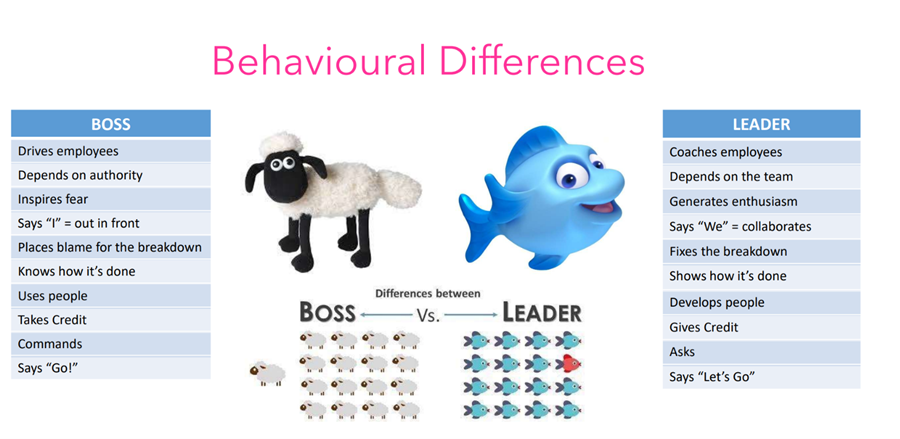Developing Future Leadership Skills: Leadership vs. Management
Across industries, employees who are technically skilled or have been with a company or enterprise for a long period are often promoted to management roles. This can be a reward for loyalty, or skill in their technical or professional field. However, a promotion without adequate preparation or the right personality fit can lead to disruption.
This is where Woohoo Co. come in, with a proven “Mates 2 Managers” program that provides the leadership skills your experienced staff need to manage a team.
Overview:
Leadership vs management
In the dynamic landscape of modern organisations, the terms "leadership" and "management" are often used interchangeably, yet they entail distinct roles and skill sets. While both are crucial for organisational success, understanding the nuances between them is pivotal. Aspiring leaders must cultivate specific skills to excel in their roles and effectively navigate the challenges of the ever-changing business environment.
What is leadership?
Leadership goes beyond authority; it is about inspiring and influencing others to achieve a common vision. Leaders focus on long-term goals, innovation, and fostering a culture of empowerment and creativity. They lead by example, setting high standards and encouraging their team members to unleash their potential.
What is management?
Management involves the coordination and execution of day-to-day tasks to ensure the smooth functioning of operations. Managers emphasise efficiency, operational structure, and adherence to procedures. They oversee processes, allocate resources, and mitigate risks to achieve predetermined objectives within specified timelines.
How leadership and management work together to drive success
While leadership and management are complementary, they operate on different levels. Leadership is about inspiring change, while management is about controlling outcomes. Effective leadership cultivates a sense of purpose and direction, fostering innovation and adaptability, whereas efficient management ensures that tasks are completed promptly and resources are utilised optimally.
Five Essential Skills For Future Leaders
As the business landscape evolves, the demand for visionary leaders continues to escalate. To prepare for the challenges ahead, aspiring leaders must hone a diverse set of skills:
Emotional Intelligence (EI)The ability to understand and manage one's emotions and empathise with others is paramount for effective leadership. Future leaders should cultivate EI to build strong relationships, resolve conflicts, and foster a positive work environment. To support career progression within your team, in our Mates to Managers program, participants complete key psychometric tests to understand self identify where there is space for growth and improvement.
1. Adaptability
In an era of rapid change, adaptability is non-negotiable. Leaders must embrace uncertainty, navigate ambiguity, and pivot strategies when necessary. By fostering a culture of flexibility and resilience, they can steer their teams through turbulent times.
2. Strategic Thinking
Leaders must possess a strategic mindset to envision the future, anticipate market trends, and capitalise on emerging opportunities. By aligning organisational objectives with a coherent strategy, they can chart a course for sustainable growth and competitive advantage.
3. Effective Communication
Effective communication is essential for strong leadership. Future leaders should focus on expressing their vision clearly, actively listening, and fostering open, transparent dialogue to build trust. It’s important to recognise that team members may have different backgrounds and communication styles, which can impact how messages are received. Simple actions like scheduling time to talk can go a long way. Strong communication also involves setting clear expectations, and tools like the CPQQRT framework can help with this. Developing the ability to handle difficult conversations with respect and grace is a skill that improves over time.
4. Empowerment
Empowering others is a hallmark of transformative leadership. Future leaders should delegate authority, encourage autonomy, and empower their team members to take ownership of their work. By nurturing a culture of empowerment, they can unlock the full potential of their teams and foster a sense of ownership and accountability.
Involving teams in the decision-making will further empower their capabilities and foster growth for future roles and opportunities. People don’t know what they don’t know. You may be an expert in your field, but how people learn and absorb knowledge is different – identifying this before team members start to not deliver is important.
Six Management Styles For Future Leaders
Drawing on research and experience, Goleman has identified six distinct leadership styles that managers can adapt, depending on the situations and the needs of their team members.
He first introduced these styles in his 2000 Harvard Business Review article, “Leadership That Gets Results,” and they have since been widely recognised as an essential framework for effective leadership.
The six leadership styles include:
Coercive leadership style, which entails demanding immediate compliance.
Authoritative leadership style, which is about mobilising people toward a vision.
Pacesetting leadership style, which involves expecting excellence and self-direction.
Affiliative leadership style, which centres around building emotional bonds.
Democratic leadership style involves creating consensus.
Coaching leadership style, which focuses on developing people for the future.
Empowering Teams Through Coaching and Multiplying Talent
Multipliers of People are Leaders who aren’t able to empower their teams could become accidental diminishers and may find that their teams have difficulty in repeating tasks taught to them.
Coaching, pacesetting and democratic leadership styles would empower teams to constantly practice and create a sense of autonomy within themselves. This creates a space of trust that the work will be done to a quality standard within the time required, creating multipliers within the organisation.
To find out if you’re a multiplier or an accidental diminisher, try out the quiz by the Wiseman Group.
Future Leadership Skills: Building Resilience, Integrity and a Culture of Continuous Learning
Continuous Learning: The pursuit of knowledge is a lifelong journey. Future leaders should cultivate a growth mindset, embrace new ideas, and actively seek opportunities for learning and development. By staying abreast of industry trends and best practices, including understanding the fundamentals of management compliance, they can adapt to evolving challenges and drive innovation within their organisations.
Resilience: Leadership is not without its setbacks and challenges. Future leaders should cultivate resilience to weather adversity, bounce back from failures, and persevere in the face of obstacles.
By demonstrating resilience, they can inspire confidence and motivate their teams to overcome obstacles and achieve their goals.
A locus of control is beneficial to understand and manage, a healthy understanding of control and where certain controllable and non-controllable factors may sit. We need to aim for a healthy adaptive locus of control and not be maladaptive.
Ethical Leadership: Integrity and ethical conduct are the cornerstones of effective leadership. Future leaders should lead by example, uphold ethical standards, and make decisions guided by principles and values. By fostering a culture of integrity and accountability, they can earn the trust and respect of their team members and stakeholders. Being on the pulse with legislative changes is important, for example, positive duties implemented by the Australian Human Rights Commission states a complete elimination of bullying and harassment in the workplace. It is up to the Managers of teams to ensure this doesn’t occur, or severe penalties could be experienced by both the Manager and the organisation.
Case study: managers misbehaving
Managers are expected to set the tone and be an example of professional behaviour, guiding their teams. Sadly, this isn’t always the case. There are many examples of people in leadership roles failing to act with professionalism, dignity and an even temper.
Ever seen a sandwich thrown across a boardroom table? It’s definitely not something you expect to see in the workplace, especially from a manager. Yet it happened. This act violates the respect and human decency we would expect within the workplace; further, it would be considered unlawful and a risk to the psychosocial health of employees under new legislation.
This type of behaviour may be considered bullying, an overt act designed to intimidate employees.
Have you been managed by a technical expert who lacks insightful leadership skills and emotional intelligence? Many have; however, you may have been lucky to have had a manager who was inspiring and did everything they could to encourage and develop you. Our Mates 2 Managers program is designed to ensure that the future leaders inside your business have the tools they need to be the latter and to embed a culture of respectful behaviour.
Develop Your Future Leadership Skills With The Woohoo Co.
Leadership and management are unique and distinct concepts, both are essential for organisational success. Aspiring leaders must recognise the nuances between them and cultivate the skills necessary to excel in their roles. By embracing emotional intelligence, adaptability, strategic thinking, effective communication, empowerment, multiplying capability, continuous learning, resilience, and ethical leadership, they can navigate the complexities of the modern business landscape and inspire positive change within their organisations.
If you want specialised advice or have any further questions, please feel free to contact our dedicated team today.
Frequently Asked Questions
-
The five core leadership skills for the future are:
Communication: The ability to clearly articulate vision, actively listen, and create space for open dialogue using frameworks like CPQQRT.
Continuous Learning: Embracing a growth mindset, staying current with industry trends, and understanding compliance fundamentals.
Resilience: Navigating challenges with adaptability and maintaining a healthy locus of control over what can and can’t be influenced.
Ethical Leadership: Leading with integrity, staying informed on legislative responsibilities, and fostering a culture of accountability.
Empowering Others: Using coaching, pacesetting or democratic leadership styles to build autonomy and trust within teams, creating multipliers across the organisation.
-
The 5 P’s principles align closely with the qualities needed for future leadership, especially as leaders take on more responsibility in areas like compliance, culture, and people development. The 5 P’s are:
Purpose: Knowing your vision and clearly communicating it.
People: Empowering and supporting teams to reach their potential.
Process: Establishing systems that allow teams to perform consistently and efficiently.
Performance: Driving results while enabling long-term growth.
Principles: Leading with values, ethics and accountability.
-
Great leaders consistently demonstrate a range of future-focused skills. These include:
Communication
Emotional intelligence
Resilience
Ethical leadership
Strategic thinking
Coaching and team empowerment
Decision-making
Accountability
Continuous learning
Cultural awareness





